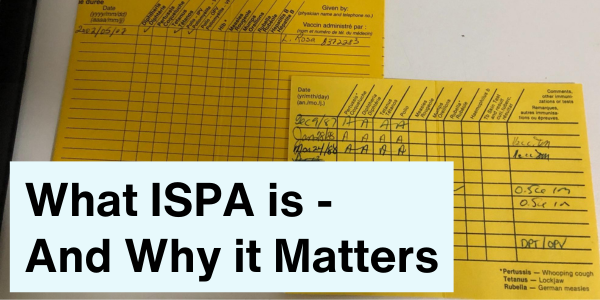
There’s a K-8 school named after Elsie MacGill in Thunder Bay. Elsie was the world’s first female aeronautical engineer, the first practicing female engineer in Canada, and a lifelong advocate for women and children. During World War II, she oversaw the production of Hawker Hurricanes in Fort William, earning her the nickname of “Queen of the Hurricanes”.
She also nearly died of polio in 1929.
And while Elsie not only survived, but thrived, I sometimes think about all of the Elsies we never got to know when I go by her namesake school; the children and other young people who died of diseases that can now be prevented with safe and effective vaccines.
The Immunization of School Pupils Act (ISPA) is a piece of Ontario legislation that helps ensure as many Ontario students as possible never experience what Elsie did. It’s also a law that I wish people knew more about; not only what it requires from students and their caregivers, but also the reason it was passed in 1990.
This is outlined in section 2: “The purpose of this Act is to increase the protection of the health of children against the diseases that are designated diseases under this Act.” I’ve bolded that part because that is what this Act is all about: the health of children. It’s not about keeping kids from school, or Government control, or big Pharma kickbacks. I mean, why would I be driving a used mid-range sedan if those existed?
This Act is about increasing the protection of children from diseases that could make them sick, result in lifelong health impacts, or even kill them. People should read this account of what a polio outbreak was like from a survivor to understand the stakes of these diseases:
“Well, I couldn't move and my voice was just a whisper at that time, but I knew what was going on. Either I would hear a respirator quit during the night or I'd see the staff come in and move somebody away from the bed next to me. And you knew they'd passed away."
Diseases like polio, diphtheria, and measles may now seem like terrible, but distant, threats, but that’s because the vaccines worked. However, they only work if we keep getting them. Once vaccine coverage rates begin to fall, these diseases can return. All it takes is one person to travel to a location where these diseases still circulate to seed an outbreak back home.
It’s happening right now with measles. Cases are soaring in Europe, where there were more than 20,000 hospitalizations and 5 deaths from measles in December. In January, a measles outbreak in Philadelphia infected 9 people, sending at least 6 of them to the hospital. It’s entirely possible that we’ll see similar outbreaks in Canada, and a case was recently confirmed in Montreal.
Measles and other diseases can spread easily in schools if more than a handful of students remain unvaccinated. If that happens, ISPA still protects children by ensuring that the Health Unit has up-to-date student vaccine records. These records determine who can safely attend school during an outbreak, and who should stay home because they lack immunity. Through this, ISPA helps students stay safe who have medical, conscientious, or religious vaccine exemptions to avoid these serious diseases.
Thanks in part to this law, the nearly 800 students at Elsie MacGill School are far less likely to encounter the serious diseases that ravaged Elsie’s generation. They’ll avoid the long recovery she endured. Instead, these students can grow and learn more safely as they discover their own skills and gifts… including those who’ll one day become engineers, like Elsie herself.
About the image: This is my actual childhood yellow card (immunization record), which recorded all the vaccines I received from 1987-2002.
